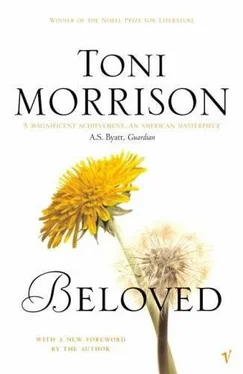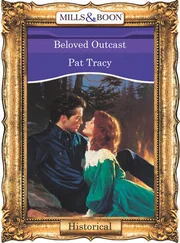She put on a shawl and told Denver and Beloved to do likewise.
All three set out late one Sunday morning, Sethe leading, the girls trotting behind, not a soul in sight.
When they reached the woods it took her no time to find the path through it because big-city revivals were held there regularly now, complete with food-laden tables, banjos and a tent. The old path was a track now, but still arched over with trees dropping buckeyes onto the grass below.
There was nothing to be done other than what she had done, but Sethe blamed herself for Baby Suggs' collapse. However many times Baby denied it, Sethe knew the grief at 124 started when she jumped down off the wagon, her newborn tied to her chest in the underwear of a whitegirl looking for Boston.
Followed by the two girls, down a bright green corridor of oak and horse chestnut, Sethe began to sweat a sweat just like the other one when she woke, mud-caked, on the banks of the Ohio.
Amy was gone. Sethe was alone and weak, but alive, and so was her baby. She walked a ways downriver and then stood gazing at the glimmering water. By and by a flatbed slid into view, but she could not see if the figures on it were whitepeople or not. She began to sweat from a fever she thanked God for since it would certainly keep her baby warm. When the flatbed was beyond her sight she stumbled on and found herself near three coloredpeople fishing- two boys and an older man. She stopped and waited to be spoken to. One of the boys pointed and the man looked over his shoulder at her-a quick look since all he needed to know about her he could see in no time.
No one said anything for a while. Then the man said, "Headin' 'cross?"
"Yes, sir," said Sethe.
"Anybody know you coming?"
"Yes, sir."
He looked at her again and nodded toward a rock that stuck out of the ground above him like a bottom lip. Sethe walked to it and sat down. The stone had eaten the sun's rays but was nowhere near as hot as she was. Too tired to move, she stayed there, the sun in her eyes making her dizzy. Sweat poured over her and bathed the baby completely. She must have slept sitting up, because when next she opened her eyes the man was standing in front of her with a smoking-hot piece of fried eel in his hands. It was an effort to reach for, more to smell, impossible to eat. She begged him for water and he gave her some of the Ohio in a jar. Sethe drank it all and begged more. The clanging was back in her head but she refused to believe that she had come all that way, endured all she had, to die on the wrong side of the river.
The man watched her streaming face and called one of the boys over.
"Take off that coat," he told him.
"Sir?"
"You heard me."
The boy slipped out of his jacket, whining, "What you gonna do? What I'm gonna wear?"
The man untied the baby from her chest and wrapped it in the boy's coat, knotting the sleeves in front.
"What I'm gonna wear?"
The old man sighed and, after a pause, said, "You want it back, then go head and take it off that baby. Put the baby naked in the grass and put your coat back on. And if you can do it, then go on 'way somewhere and don't come back."
The boy dropped his eyes, then turned to join the other. With eel in her hand, the baby at her feet, Sethe dozed, dry-mouthed and sweaty. Evening came and the man touched her shoulder.
Contrary to what she expected they poled upriver, far away from the rowboat Amy had found. Just when she thought he was taking her back to Kentucky, he turned the flatbed and crossed the Ohio like a shot. There he helped her up the steep bank, while the boy without a jacket carried the baby who wore it. The man led her to a brush-covered hutch with a beaten floor.
"Wait here. Somebody be here directly. Don't move. They'll find you."
"Thank you," she said. "I wish I knew your name so I could remember you right."
"Name's Stamp," he said. "Stamp Paid. Watch out for that there baby, you hear?"
"I hear. I hear," she said, but she didn't. Hours later a woman was right up on her before she heard a thing. A short woman, young, with a croaker sack, greeted her.
"'Saw the sign a while ago," she said. "But I couldn't get here no quicker."
"What sign?" asked Sethe.
"Stamp leaves the old sty open when there's a crossing. Knots a white rag on the post if it's a child too."
She knelt and emptied the sack. "My name's Ella," she said, taking a wool blanket, cotton cloth, two baked sweet potatoes and a pair of men's shoes from the sack. "My husband, John, is out yonder a ways. Where you heading?"
Sethe told her about Baby Suggs where she had sent her three children.
Ella wrapped a cloth strip tight around the baby's navel as she listened for the holes-the things the fugitives did not say; the questions they did not ask. Listened too for the unnamed, unmentioned people left behind. She shook gravel from the men's shoes and tried to force Sethe's feet into them. They would not go. Sadly, they split them down the heel, sorry indeed to ruin so valuable an item. Sethe put on the boy's jacket, not daring to ask whether there was any word of the children.
"They made it," said Ella. "Stamp ferried some of that party.
Left them on Bluestone. It ain't too far."
Sethe couldn't think of anything to do, so grateful was she, so she peeled a potato, ate it, spit it up and ate more in quiet celebration.
"They be glad to see you," said Ella. "When was this one born?"
"Yesterday," said Sethe, wiping sweat from under her chin. "I hope she makes it."
Ella looked at the tiny, dirty face poking out of the wool blanket and shook her head. "Hard to say," she said. "If anybody was to ask me I'd say, 'Don't love nothing.' " Then, as if to take the edge off her pronouncement, she smiled at Sethe. "You had that baby by yourself?"
"No. Whitegirl helped."
"Then we better make tracks."
Baby Suggs kissed her on the mouth and refused to let her see the children. They were asleep she said and Sethe was too uglylooking to wake them in the night. She took the newborn and handed it to a young woman in a bonnet, telling her not to clean the eyes till she got the mother's urine.
"Has it cried out yet?" asked Baby.
"A little."
"Time enough. Let's get the mother well."
She led Sethe to the keeping room and, by the light of a spirit lamp, bathed her in sections, starting with her face. Then, while waiting for another pan of heated water, she sat next to her and stitched gray cotton. Sethe dozed and woke to the washing of her hands and arms. After each bathing, Baby covered her with a quilt and put another pan on in the kitchen. Tearing sheets, stitching the gray cotton, she supervised the woman in the bonnet who tended the baby and cried into her cooking. When Sethe's legs were done, Baby looked at her feet and wiped them lightly. She cleaned between Sethe's legs with two separate pans of hot water and then tied her stomach and vagina with sheets. Finally she attacked the unrecognizable feet.
"You feel this?"
"Feel what?" asked Sethe.
"Nothing. Heave up." She helped Sethe to a rocker and lowered her feet into a bucket of salt water and juniper. The rest of the night Sethe sat soaking. The crust from her nipples Baby softened with lard and then washed away. By dawn the silent baby woke and took her mother's milk.
"Pray God it ain't turned bad," said Baby. "And when you through, call me." As she turned to go, Baby Suggs caught a glimpse of something dark on the bed sheet. She frowned and looked at her daughter-in-law bending toward the baby. Roses of blood blossomed in the blanket covering Sethe's shoulders. Baby Suggs hid her mouth with her hand. When the nursing was over and the newborn was asleep-its eyes half open, its tongue dream-sucking-wordlessly the older woman greased the flowering back and pinned a double thickness of cloth to the inside of the newly stitched dress.
Читать дальше











